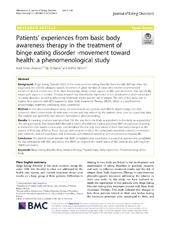| dc.contributor.author | Albertsen, Marit Nilsen | en_US |
| dc.contributor.author | Natvik, Eli | en_US |
| dc.contributor.author | Råheim, Målfrid | en_US |
| dc.date.accessioned | 2020-06-12T13:34:24Z | |
| dc.date.available | 2020-06-12T13:34:24Z | |
| dc.date.issued | 2019-10-21 | |
| dc.Published | Albertsen, Natvik E, Råheim M. Patients’ experiences from basic body awareness therapy in the treatment of binge eating disorder -movement toward health: a phenomenological study. Journal of Eating Disorders. 2019;7:36 | eng |
| dc.identifier.issn | 2050-2974 | |
| dc.identifier.uri | https://hdl.handle.net/1956/22569 | |
| dc.description.abstract | Background Binge Eating Disorder (BED) is the most common eating disorder. Patients with BED are often not diagnosed, nor offered adequate specific treatment. A great number of those who receive recommended treatment do not recover over time. More knowledge about central aspects of BED, and treatments that specifically target such aspects is needed. Previous research has linked body experience to the development and maintenance of eating disorders, as well as influencing treatment results and the risk of relapse. The aim of this study was to explore how patients with BED experience Basic Body Awareness Therapy (BBAT), which is a psychomotor physiotherapy treatment addressing body experience. Method In this phenomenological study, we interviewed two patients with BED in depth during and after treatment. Video observations of treatment sessions and logs written by the patients were used as supporting data. The analysis was guided by Van Manen’s hermeneutic phenomenology. Results A meaning structure was identified: “On the way from the body as a problem to the body as a possibility.” The two participants that besides BED also had a history of childhood trauma, perceived BBAT as a process of getting to know their own bodies in new ways, and described that the way they related to their own body changed as did aspects of their way of being. These changes were prominent when the participants described emotions, movement, pain, calmness, and self-experience, and interwoven with relational aspects as well as practices in everyday life. Conclusion The present results indicate that BBAT stimulated body experience in a way that opened new possibilities for two participants with BED, and hence that BBAT can improve the health status of BED patients also suffering from childhood trauma. | en_US |
| dc.language.iso | eng | eng |
| dc.publisher | BMC | eng |
| dc.rights | Attribution CC BY | eng |
| dc.rights.uri | http://creativecommons.org/licenses/by/4.0/ | eng |
| dc.title | Patients’ experiences from basic body awareness therapy in the treatment of binge eating disorder -movement toward health: a phenomenological study | en_US |
| dc.type | Peer reviewed | |
| dc.type | Journal article | |
| dc.date.updated | 2020-02-02T14:27:26Z | |
| dc.description.version | publishedVersion | en_US |
| dc.rights.holder | Copyright 2019 The Author(s) | |
| dc.identifier.doi | https://doi.org/10.1186/s40337-019-0264-0 | |
| dc.identifier.cristin | 1739825 | |
| dc.source.journal | Journal of Eating Disorders | |

